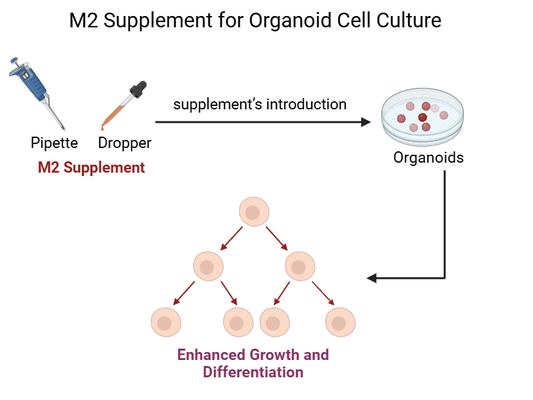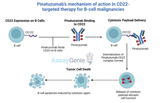M2 Supplement for Organoid Cell Culture: Enhancing Growth and Differentiation
The use of M2 Supplement in organoid culture has revolutionized the way researchers cultivate and maintain these three-dimensional (3D) cellular models. Organoids—self-organizing cell clusters that mimic the structure and function of actual tissues and organs—are widely used in disease modeling, drug discovery, and regenerative medicine. M2 Supplement enhances organoid culture by providing essential nutrients and growth factors that support the growth, viability, and differentiation of cells within these complex systems.
1. What is M2 Supplement?
M2 Supplement is a cell culture additive specifically formulated to support the growth and differentiation of organoids and 3D cell cultures. It typically contains a blend of growth factors, vitamins, amino acids, and other bioactive molecules tailored to meet the metabolic needs of organoid cultures. While the exact composition may vary depending on the supplier, M2 Supplement often includes:
- Growth factors: To support cell proliferation and survival.
- Antioxidants: To minimize oxidative stress, which can be high in organoid cultures.
- Nutrients: Vitamins and amino acids that are essential for cellular metabolism and energy production.
- Extracellular Matrix Components: Some formulations may include molecules that aid cell adhesion and structure in 3D cultures.
2. Benefits of Using M2 Supplement in Organoid Culture
Enhanced Organoid Growth and Expansion
- Improved Cell Viability: M2 Supplement provides a balanced nutrient environment, reducing cell death and supporting longer culture durations.
- Rapid Cell Proliferation: Growth factors included in M2 Supplement stimulate cell division, resulting in faster expansion and larger organoid structures.
Support for Organoid Differentiation
- Promotes Tissue-Specific Differentiation: M2 Supplement provides signaling molecules that
encourage cells to differentiate into tissue-specific lineages, important for applications like disease modeling and drug testing. - Enhanced Structural Organization: By supporting differentiation, M2 Supplement helps organoids develop structural characteristics that more closely mimic in vivo tissues.
Increased Culture Stability
- Reduces Metabolic Stress: Organoid cultures have high metabolic demands. The vitamins, antioxidants, and amino acids in M2 Supplement help maintain a stable metabolic environment, reducing cell stress and extending culture viability.
- Minimizes Variability: M2 Supplement standardizes the culture environment, leading to more
consistent results across experiments, an important factor for drug screening and regenerative applications.
3. How to Use M2 Supplement in Organoid Culture
Protocol Overview
- Prepare Base Medium: Organoid culture typically begins with a base medium such as Advanced DMEM/F-12, often supplemented with essential additives like glutamine, HEPES, and penicillin-streptomycin.
- Add M2 Supplement: Following the supplier’s recommended concentration, usually around 1x (10% v/v).
- Include Additional Factors if Needed: For certain types of organoids (e.g., gut or brain organoids), add tissue-specific factors such as EGF (epidermal growth factor), Noggin, or R-spondin to drive differentiation.
Suggested Protocol Steps
Step | Details |
|---|---|
1. Thaw M2 Supplement | Slowly thaw on ice or at 4°C to preserve the stability of factors. |
2. Prepare Organoid Medium | Mix base medium, M2 Supplement, and additional growth factors. |
3. Add to Organoid Culture | Replace medium every 2-3 days with fresh medium containing M2. |
4. Applications of M2 Supplement in Organoid Culture
Disease Modeling
M2 Supplement enables organoid cultures to better mimic the cellular environment of various tissues, making it ideal for modeling diseases such as:
- Cancer: Tumor organoids can benefit from M2 Supplement to maintain the viability of rapidly dividing cells.
- Infectious Diseases: M2 Supplement can support organoids for pathogen infection models, such as gut or lung organoids infected with viruses or bacteria.
Drug Screening and Toxicology
By promoting growth and differentiation, M2 Supplement allows for the generation of mature, stable organoids suitable for:
- High-Throughput Drug Screening: Consistent organoid growth and stability make M2 Supplement valuable for testing drug efficacy and toxicity.
- Personalized Medicine: Patient-derived organoids grown with M2 Supplement can be used to test individual responses to drugs.
Regenerative Medicine
The support for differentiation and tissue-specific development makes M2 Supplement valuable in:
- Stem Cell Research: By providing necessary nutrients and growth factors, M2 Supplement
facilitates stem cell differentiation in organoid structures. - Tissue Engineering: Supports the long-term culture of organoids for regenerative applications, aiding in tissue repair and transplantation research.
5. Considerations and Tips for Using M2 Supplement
Consideration | Recommendation |
|---|---|
Medium Change Frequency | Change medium every 2-3 days to maintain nutrient levels and prevent buildup of metabolic byproducts. |
Concentration Optimization | Follow the recommended concentration; consider testing different concentrations for optimal growth. |
Compatibility | Ensure compatibility with your specific organoid type (e.g., intestinal, hepatic) and add specific factors as needed. |
Conclusion
M2 Supplement is a powerful addition to organoid cultures, providing the nutrients and growth factors required for consistent growth, differentiation, and stability. By enhancing the culture environment, M2 Supplement enables researchers to generate robust organoid models suitable for applications in disease modeling, drug screening, and regenerative medicine.
Recent Posts
-
Tigatuzumab Biosimilar: Harnessing DR5 for Targeted Cancer Therapy
Tigatuzumab is a monoclonal antibody targeting death receptor 5 (DR5), a member of the …17th Dec 2025 -
Alemtuzumab: Mechanism, Applications, and Biosimilar Advancements
Alemtuzumab is a monoclonal antibody targeting CD52, a glycoprotein highly expressed on …13th Jan 2025 -
Pinatuzumab: Advancing Cancer Research and Therapeutics
Pinatuzumab vedotin is an antibody-drug conjugate (ADC) targeting CD22, a cell surface …13th Jan 2025




